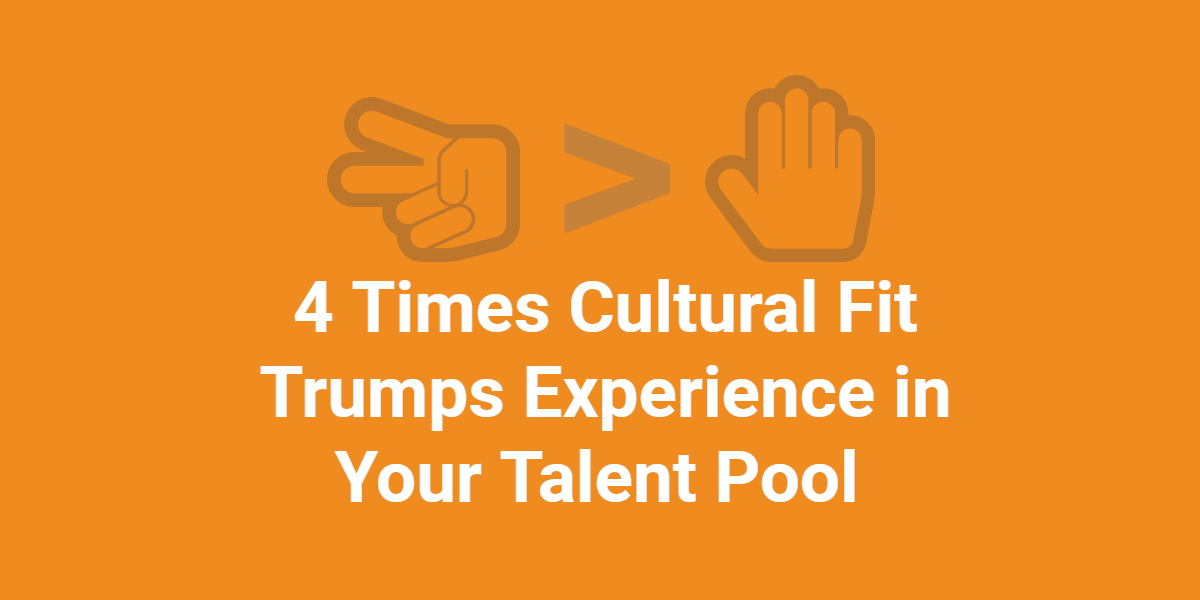We’re all looking for them — the perfect candidates to grow our talent pool.
They have the skills, experiences, and a personality that immediately blends in with your team. Unfortunately, looking for one ultimate candidate could be decreasing your talent pool — and costing you quality hires.
Filling your talent pool with candidates who will excel at your company often goes far beyond their previous experiences. In order to do this, you need to be aware of when to hire a candidate who fits culturally over one with the proven experience on paper.
To get you started, here are four times when you need to hire for cultural fit over experience:
1. When they see the bright side of situations.

Don’t take lightly when a candidate demonstrates an openness to change as an opportunity rather than a threat. Other notable traits are if they view failure as learning, and if they are eager to grow professionally as opposed to showing tentativeness toward new challenges.
These qualities should also be part of the company’s culture.
One time, we had narrowed down two candidates for a sales manager role at a major international company. I advised a vice-president of sales to hire the less experienced candidate over a more experienced candidate because the former demonstrated the characteristics above. Whereas, the more experienced candidate was confident that he knew his business and alluded he had little left to learn.
The vice-president hired the less experienced candidate.
Two years later, the vice-president told me it was the right choice. His performance was outstanding, and he has been short-listed for promotion to a higher level of leadership. The vice-president continued to use the same criteria for other new hires.
Steven Bleistein, CEO of Relansa, Inc.
2. When the employee is customer-facing.

Identifying whether someone’s values align with those of your company is essential for ensuring cultural fit when building your talent pool. Ideally, cultural fit in the company comes first because character cannot be built as easily as experience. After all, it is pretty standard procedure to train employees for up to two weeks.
Cultural fit is not exclusive to the working environment. Any employee with good character, upstanding values, and an outgoing personality will be more trusted to speak to my customers.
I do a lot of hiring for work-from-home positions and encounter this constantly. There were times when I interviewed two people, one with significantly more years of experience, and cultural fit won me over. This happened because one candidate had 5 five years of telemarketing experience at the same company reading from a script. They did not convey any people skills nor a positive attitude.
In comparison, the other applicant had only one year of experience working as a freelancer, but we got along from the very beginning. I knew that since his responsibilities would include talking to customers, if he made them feel as comfortable as he made me feel, then it would be a win-win situation. His career has definitely taken off since then, but it was one of the best hires I had the pleasure of making.
Simon Dlugowski, Founder & CEO of MySocialNerd
3. When you’re creating something new and innovative.

We have found that our best new hires are those that haven’t been prejudiced by much bigger and more established firms. We are trying to build something innovative, and this often requires a new way of thinking. Company culture is therefore important as the way our team works together to create IP.
Often, experienced hires can offer a lot of the same thing, which can bring incredible value to a firm. If the team is already very experienced, it makes sense to recruit someone who is the best cultural fit and can be nurtured by the already experienced team. We have learned so much from our young team, and I believe they have learned a lot from the grey hair in the room, too!
It is important to encourage these hires to understand they are creating the role for themselves and, if successful, they will quickly be managing a team based on the blueprint they have formed. Supplementing this with access to advisors and experienced professionals who are not on the payroll means we can benefit from the best of both worlds.
Andrew Gardiner, CEO of Property Moose
4. When hiring for a leadership position.
 In many senior leadership positions, emotional intelligence and business acumen weigh heavier than industry knowledge. Private equity firms have figured this out by hiring savvy leaders who understand how to make money and have strong EQ, regardless of the industry served.
In many senior leadership positions, emotional intelligence and business acumen weigh heavier than industry knowledge. Private equity firms have figured this out by hiring savvy leaders who understand how to make money and have strong EQ, regardless of the industry served.
We were asked to conduct a search for the Executive Director of our local non-profit, Homeless Connections. We had several candidates who had either not-for-profit backgrounds or had worked previously with the homeless population.
However, one candidate was very outside-the-box. He was a captain for our local police department, had strong emotional intelligence, witnessed tough situations homelessness caused first hand, and was seeking to do something very different with his life. When we presented the short-list of five candidates, one member of the search committee was very vocal, thinking the captain’s candidacy wasn’t a fit for the role.
We always make the agreement up front that the client will interview all five of our finalists and of course, the captain was offered the job. Why? Not because his experience was even close to the others, as it related to the mission. They could tell he absolutely had the right heart and culture fit for the role. That was five years ago and they are now one of the most successful not-for-profits in our area.
Sharon Hulce, president of Employment Resource Group, an Appleton, Wisconsin affiliate of MRINetwork.
—
When does cultural fit trump experience in your talent pool? Let us know!







